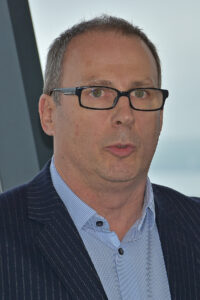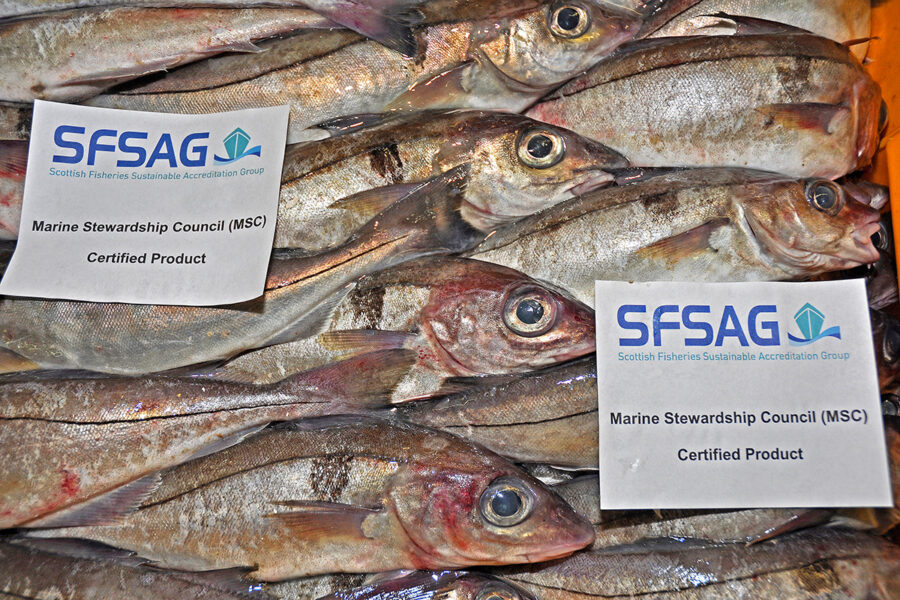Scottish industry blasts Marine Conservation Society.
Above: SFSAG haddock has held MSC accreditation since 2010.
The Scottish industry is furious at advice to the public that North Sea and west of Scotland haddock stocks are at risk and consumption should be restricted, reports Tim Oliver.
The advice came from the Marine Conservation Society (MCS) in its latest consumer guide on which species are safe to eat because stocks are healthy, and which should be avoided. In its Good Fish Guide, published on 17 March, the MCS downgraded three haddock fisheries in the North Sea and West of Scotland ‘due to a change in scientific advice. This means the fisheries are no longer on its recommended green list of fish to eat’.
To publicise its downgrade, the MSC issued a press release headlined ‘Takeaway favourite from North Sea and West of Scotland area no longer the best partner for chips’, which was widely reported on TV and social media, as well as the national press.
In a devastating letter to the MCS, the Scottish Fisheries Sustainable Accreditation Group (SFSAG) accuses the MCS of ‘extremely reckless behaviour’ in undermining consumer confidence in Scottish haddock.
SFSAG chairman Mike Park spells out in detail the sustainability credentials of the haddock fishery and says the MCS statements are ‘thoroughly damaging and misleading’.
He tells the MCS: “We will be closely monitoring the financial implications of your words and actions and will seek legal advice if necessary” (see full letter, below).
The Scottish Fishermen’s Federation angrily called for a retraction, and the MCS’ recommendation was immediately rejected by leading international marine conservation organisation, the Marine Stewardship Council (MSC), that has given its healthy stock accreditation to North Sea haddock.
Insisting that the fishery is well-managed at sustainable levels, SFF chief executive Bertie Armstrong said: “The MCS has completely misunderstood the position as far as haddock stocks are concerned, and should withdraw its utterly misleading comments.
“The organisation is trying to alter consumer behaviour on completely false premises and should desist at once. Fish stocks are sustainable when the amount of fish caught is below the maximum sustainable yield (MSY).
“For haddock that has been the case since 2007 – and, only last year, advice from fisheries scientists at ICES was for an increase in the catch of 30%.
“They then discovered that there had been an error in their assessments, corrected the statistical model and recommended a reduction in the catch of 45%, which was adopted.
“As a result, the fishery continues to be managed at sustainable levels, and the spawning stock for haddock will increase significantly next year.”
The Marine Stewardship Council, which assesses and accredits sustainable fisheries with the blue MSC label, also rejected the MCS downgrade and said that consumers can enjoy haddock suppers with ‘a clear conscience’.
North Sea haddock is a MSC-accredited sustainable fishery and MSC spokesman James Simpson said: “The Scottish haddock fishery is still MSC-certified due to the strong management they have in place to deal with changing stocks.
“The Scottish haddock fishermen have already worked with the government to set lower quotas in response to the latest scientific advice. In fact, they’ve set their catches even lower than the recommendations. It’s a bold move to protect the haddock stock for the long term.
“This is a great example of a responsible, reactive management responding to fluctuations in stock status and that’s exactly what MSC certification is about – long-term sustainability. You can still choose MSC-certified Scottish haddock for your Friday night fish and chips with a clear conscience.”
Speaking after the Marine Conservation Society issued its press release and downgrade, James Simpson said he would be choosing MSC-labelled Scottish haddock for his fish and chip supper that night ‘knowing that it’s been caught by responsible fishermen with sustainable management that’s been checked and monitored by the world’s most rigorous scientific test of sustainability’.
He told Fishing News: “I’m also going to go to The Bay fish and chips restaurant in Stonehaven next Friday for some of the world’s best MSC-certified Scottish North Sea haddock and chips.”
MCS: ‘Scientific view of stock has changed’
The MCS grades fisheries from 1 to 5, where 1 is ‘green’ and recommended, and 5 is ‘red’ – unsustainable and to be avoided. Two North Sea haddock fisheries are now rated 4 (amber), and the other has dropped from being a good choice (rated 2) to one to eat only occasionally (rated 3).
Commenting on the downgrade, Good Fish Guide manager Bernadette Clarke said: “These ratings changes have come about because scientific perception of the stock has changed. Compared to 2015, the stock numbers in 2016 were below the recommended level and at the point where action is now needed to increase the number of fish of breeding age.”
But after the storm of industry outrage, the MSC issued a clarification of its advice. It said: “MCS has not called for haddock to be taken off menus. MCS only actively asks this when a fishery or farming method is red rated (rated 5). The new ratings for North Sea and West of Scotland haddock are 3 and 4.”
It said the new ratings followed latest ICES advice for a 47% [sic] cut in the TAC for 2017 compared with 2016, which meant a smaller proportion of fish should be caught.
“Latest quotas have been reduced in line with this scientific advice, and the biomass is expected to significantly increase this year,” said the MCS.
“Contrary to some suggestions, consumers should not expect to see a shortage of haddock in shops.”
It said a new assessment will be undertaken later this year. “When new ICES advice becomes available, and if the health of the fishery has improved as expected, this will be reflected in MCS ratings.
“Through our Good Fish Guide, we encourage people to make informed buying decisions, and to try and choose seafood from the fisheries and farming methods that have the least impact on our seas.”
Letter from SFSAG to Marine Conservation Society

Mike Park, Chair of the Scottish Sustainable Accreditation Group (SFSAG).
I write this letter as Chair of the Scottish Sustainable Accreditation Group (SFSAG) in response to the extremely reckless behaviour by MCS on Friday 17 March. The press release, headed, ‘Takeaway favourite from North Sea and West of Scotland area no longer the best partner for chips’, set out to create the maximum impact possible on the Scottish catching sector. A sector which has done more than any other to recover and protect fish stocks, including North Sea and West of Scotland haddock.
Not only is your assessment of the current risk to the stock inaccurate, your statements on the issue are thoroughly damaging and misleading. Impartial advice to the consumer should be based on facts backed by science. Not headline-grabbing comments to promote your organisation.
In the MCS press release Bernadette Clarke states: “scientific perception of the stock has changed and that action is now required to address the fact”. Clarke should know this; stock management measures were agreed between the EU and Norway in Bergen on 2 December 2016, and ratified on 14 December in the EU Council of Ministers. The measures were implemented from 1 January, 2017.
On 17 March, The Times ran an article quoting Clarke: “Consumers wanting haddock should ask for fish from the Arctic or Iceland”. In the same article she is similarly quoted questioning the legality of our fishery claiming that, ‘Scottish fishermen are still catching small haddock despite rules requiring fishermen to increase the mesh size of their nets’.
Clarke’s comments are not only naïve, but inaccurate and damaging to our sector. Fishermen work hard, under dangerous conditions, to provide food legally and sustainably.
While I recognise that your media team followed up the story and later stated that MCS was not suggesting that Scottish haddock should be taken off the menu, the damage had been done. Your ill-intended comments have raised a question mark over the sustainably of haddock. Consumers, food processors, and restaurant-buyers are now facing confusion. It was noted that in your press release, you failed to acknowledge that North Sea haddock is currently certified under the gold standard of MSC certification. Nor did you contact the sector for our reactions before publishing your press release.
We will be closely monitoring the financial implications of your words and actions and will seek legal advice if necessary.
The situation with North Sea and West of Scotland haddock is clear. During the 2016 assessment, an error in the stock assessment model was discovered. In addressing this matter, fisheries scientists at the International Council for the Exploration of the Seas (ICES) corrected the statistical model, reviewed the reference points for fishing mortality and reassessed the advice.
The updated assessment resulted in a reduction in the haddock catch advice by 45%. This is based on fishing for 2017 at a rate of 0.1, (fishing at the sustainable rate of MSY). This will see the spawning stock, which is currently above the precautionary approach reference point, increasing to 206,000 tonnes next year, well above the MSY reference point. In effect, fishing activity is being managed at sustainable levels. I am curious as to why neither the MCS nor Clarke recognised this in your press release.
I look forward to your response.
Mike Park
Read more news from Fishing News here.








